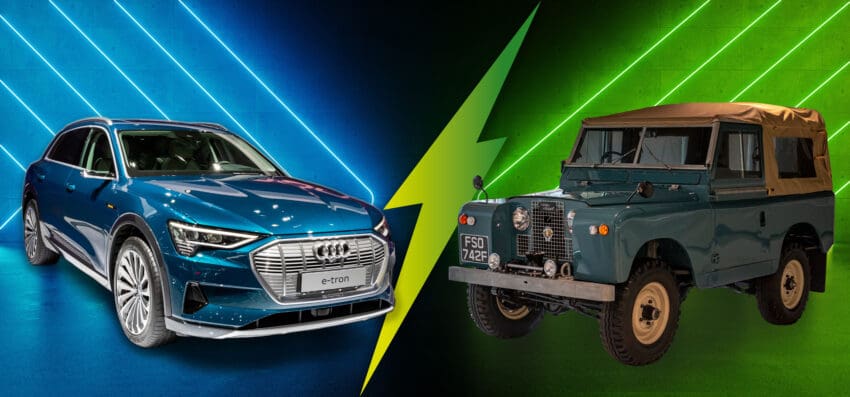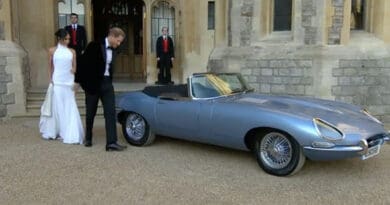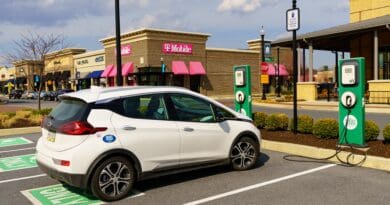
Insuring the Future: Why classic electric conversions could be the smart choice
In the ever-evolving landscape of electric vehicles, the focus has primarily been on cutting-edge technology, sleek designs, and eco-friendly driving experiences.
However, as electric cars become more mainstream, a surprising trend is emerging in the world of insurance that challenges conventional wisdom: classic cars converted to electric power might just be the key to cheaper and more reasonable insurance premiums.
We recently spoke to James Thompson, a forward-thinking car enthusiast based just outside London. The owner of both a three-year-old Audi e-tron 50 Black Edition and a 1963 Series II Land Rover converted to electric power with a Tesla motor, Thompson recently faced the annual ordeal of insurance renewal.
To his astonishment, the insurance quotes presented a stark contrast: £1100 for the Audi and a mere £264 for the classic electric Land Rover with both cars having very similar replacement costs.
The disparity in insurance costs raises questions about the insurance industry’s approach to electric vehicles and the potential benefits of choosing classic electric conversions over brand-new electric cars.
The Electric Dilemma: High Premiums for New EVs
As the popularity of electric cars continues to rise, so does the cost of insuring them. New electric vehicles, equipped with the latest technology are perceived as high-risk investments by insurance providers. The extensive repair costs associated with cutting-edge electric components and complex systems contribute to the elevated insurance premiums.
The case of Thompson’s Audi e-tron exemplifies this phenomenon. Despite being a reputable model and only three years old, the insurance renewal quote surpassed the £1000 mark, nearly double the previous year’s cost of £647 raising eyebrows and prompting him to explore alternative options.
The Classic Advantage: A Surprising Solution
Enter the classic car converted to electric power. Classic cars hold a certain charm and nostalgic appeal, but when coupled with modern electric drivetrains, they offer a unique blend of heritage and sustainability. More surprisingly, they come with a distinct advantage in the insurance arena.
Thompson’s 1963 Series II Land Rover, with its Tesla motor conversion, provided a stark contrast in insurance costs. Valued at the same price as his Audi e-tron, the Land Rover’s insurance quote of £264 left him pleasantly surprised. The classic electric conversion seemed to defy the expected trends in the insurance market.
Breaking Down the Numbers: Why the Disparity?
Repair Costs:
New electric vehicles often feature cutting-edge technology that requires specialized knowledge for repairs. Classic electric conversions, on the other hand, leverage existing platforms with simpler electric systems, making repairs and maintenance more straightforward and cost-effective.
Parts Availability: Classic cars, even with electric conversions, usually rely on widely available and standardized components. This ensures that replacement parts are easier to find and more affordable, contributing to lower insurance premiums.
Perceived Risk: Insurance providers may view classic electric conversions as lower-risk propositions due to the driving habits of their owners. Classic car enthusiasts typically drive their vehicles with greater care and tend to clock fewer miles compared to daily commuters, reducing the likelihood of accidents.
The Environmental Angle: Repurposing the Past for a Sustainable Future
Beyond the cost savings, classic electric conversions offer an eco-friendly alternative to traditional internal combustion engines. By repurposing classic cars, enthusiasts contribute to the reduction of carbon footprints associated with manufacturing new vehicles. The juxtaposition of a timeless design with the latest in electric propulsion technology creates a harmonious blend of past and future.
The Road Ahead: Navigating Insurance for EV Owners
As electric vehicles continue to gain traction, it is essential for both consumers and insurers to adapt to the changing landscape. While new EVs boast impressive features, the classic electric conversion market presents a compelling option for those seeking affordable insurance without compromising on the electric driving experience.
Thompson’s experience serves as a case in point as the classic electric conversion trend gains momentum, insurance providers of mainstream new electric cars may need to reevaluate their risk assessments and pricing models to remain competitive in the evolving automotive landscape.
It is clear that the classic electric conversion market is proving to be more than just a niche trend; it is emerging as a viable solution for those looking to enjoy the benefits of electric driving without breaking the bank on insurance premiums. As the automotive industry evolves, the wisdom of repurposing the past for a sustainable future is becoming increasingly clear, making classic electric conversions an exciting and pragmatic choice for the modern electric car enthusiast.





